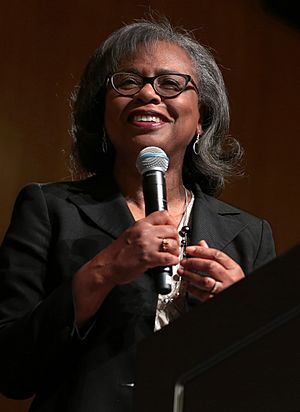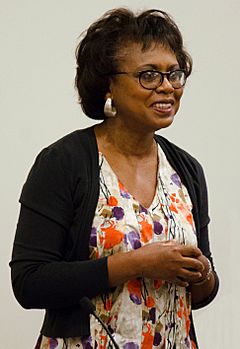Anita Hill facts for kids
Quick facts for kids
Anita Hill
|
|
|---|---|

Hill in 2018
|
|
| Born |
Anita Faye Hill
July 30, 1956 Lone Tree, Oklahoma, U.S.
|
| Education | Oklahoma State University (BS) Yale University (JD) |
| Employer | Brandeis University |
Anita Faye Hill (born July 30, 1956) is an American lawyer, educator and author. She is a professor of social policy, law, and women's studies at Brandeis University and a faculty member of the university's Heller School for Social Policy and Management.
Contents
Early life and education
Anita Hill was born to a family of farmers in Lone Tree, Oklahoma, the youngest of Albert and Erma Hill's 13 children. Her family came from Arkansas, where her maternal grandfather Henry Eliot and all of her great-grandparents had been born into slavery. Hill was raised in the Baptist faith.
Hill graduated from Morris High School, Oklahoma in 1973, where she was class valedictorian. After high school, she enrolled at Oklahoma State University and received a bachelor's degree in psychology with honors in 1977. She studied at Yale Law School, obtaining her Juris Doctor degree with honors in 1980.
Early career
Hill was admitted to the District of Columbia Bar in 1980 and began her law career as an associate with the Washington, D.C. firm of Wald, Harkrader & Ross. In 1981, she became an attorney-adviser to Clarence Thomas, who was then the Assistant Secretary of the U.S. Department of Education's Office for Civil Rights. When Thomas became chairman of the U.S. Equal Employment Opportunity Commission (EEOC) in 1982, Hill served as his assistant, leaving the job in 1983.
Hill then became an assistant professor at the Evangelical Christian O. W. Coburn School of Law at Oral Roberts University where she taught from 1983 to 1986. In 1986, she joined the faculty at the University of Oklahoma College of Law where she taught commercial law and contracts.
In 1989, she became the first tenured African American professor at OU. She left the university in 1996 due to ongoing calls for her resignation that began after her 1992 testimony. In 1998, she became a visiting scholar at Brandeis University and, in 2015, a university professor at the school.
Continued work and advocacy
Hill continued to teach at the University of Oklahoma, though she spent two years as a visiting professor in California. She resigned her post in October 1996 and finished her final semester of teaching there. In her final semester, she taught a law school seminar on civil rights. An endowed chair was created in her name, but was later defunded without ever having been filled.
Hill accepted a position as a visiting scholar at the Institute for the Study of Social Change at University of California, Berkeley in January 1997, but soon joined the faculty of Brandeis University—first at the Women's Studies Program, later moving to the Heller School for Social Policy and Management. In 2011, she also took a counsel position with the Civil Rights & Employment Practice group of the plaintiffs' law firm Cohen Milstein.
Over the years, Hill has provided commentary on gender and race issues on national television programs, including 60 Minutes, Face the Nation, and Meet the Press. She has been a speaker on the topic of commercial law as well as race and women's rights. She is also the author of articles that have been published in The New York Times and Newsweek and has contributed to many scholarly and legal publications in the areas of international commercial law, bankruptcy, and civil rights.
In 1995, Hill co-edited Race, Gender and Power in America: The Legacy of the Hill-Thomas Hearings with Emma Coleman Jordan. In 1997 Hill published her autobiography, Speaking Truth to Power, in which she chronicled her role in the Clarence Thomas confirmation controversy and wrote that creating a better society had been a motivating force in her life. In 2011, Hill published her second book, Reimagining Equality: Stories of Gender, Race, and Finding Home, which focuses on the sub-prime lending crisis that resulted in the foreclosure of many homes owned by African-Americans. She calls for a new understanding about the importance of a home and its place in the American Dream. On March 26, 2015, the Brandeis Board of Trustees unanimously voted to recognize Hill with a promotion to Private University Professor of Social Policy, Law, and Women's Studies.
Writings
In 1994, Hill wrote a tribute to Thurgood Marshall, the first African American Supreme Court Justice who preceded Clarence Thomas, titled "A Tribute to Thurgood Marshall: A Man Who Broke with Tradition on Issues of Race and Gender". She outlined Marshall's contributions to the principles of equality as a judge and how his work has affected the lives of African Americans, specifically African American women.
On October 20, 1998, Hill published the book Speaking Truth to Power.
Hill became a proponent for women's rights and feminism. This can be seen through the chapter she wrote in the 2007 book Women and leadership: the state of play and strategies for change. She wrote about women judges and why, in her opinion, they play such a large role in balancing the judicial system. She argues that since women and men have different life experiences, ways of thinking, and histories, both are needed for a balanced court system. She writes that in order for the best law system to be created in the United States, all people need the ability to be represented.
In 2011, Hill's second book, Reimagining Equality: Stories of Gender, Race, and Finding Home was published. She discusses the relationship between the home and the American Dream. She also exposes the inequalities within gender and race and home ownership. She argues that inclusive democracy is more important than debates about legal rights. She uses her own history and history of other African American women such as Nannie Helen Burroughs, in order to strengthen her argument for reimagining equality altogether.
On September 28, 2021, Hill published the book Believing: Our Thirty-Year Journey to End Gender Violence.
Awards and recognition
Hill received the American Bar Association's Commission on Women in the Profession's "Women of Achievement" award in 1992. In 2005, Hill was selected as a Fletcher Foundation Fellow. In 2008 she was awarded the Louis P. and Evelyn Smith First Amendment Award by the Ford Hall Forum. She also serves on the board of trustees for Southern Vermont College in Bennington, Vermont. Her opening statement to the Senate Judiciary Committee in 1991 is listed as No. 69 in American Rhetoric's Top 100 Speeches of the 20th Century (listed by rank). She was inducted into the Oklahoma Women's Hall of Fame in 1993. On January 7, 2017, Hill was inducted as an honorary member of Zeta Phi Beta sorority at their National Executive Board Meeting in Dallas, Texas. The Wing's Washington, D.C. location has a phone booth dedicated to Hill.
Minor planet 6486 Anitahill, discovered by Eleanor Helin, is named in her honor. The official naming citation was published by the Minor Planet Center on November 8, 2019 (M.P.C. 117229).
Honorary doctorates
- 2001: Simmons University
- 2001: Dillard University
- 2003: Smith College
- 2007: Lasell University
- 2008: Massachusetts College of Liberal Arts
- 2013: Mount Ida College
- 2017: Emerson College
- 2018: Wesleyan University
- 2019: Lesley University
- 2022: Mount Holyoke College
See also
 In Spanish: Anita Hill para niños
In Spanish: Anita Hill para niños
- Clarence Thomas Supreme Court nomination
- Brett Kavanaugh Supreme Court nomination
- Christine Blasey Ford


